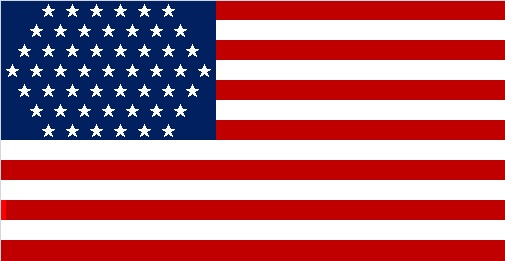DC Deserves the Bottom Line: Statehood

Ralph Sullivan, Wikimedia Commons, Creative Commons
If Washington DC became a state, the new US flag might look something like this.
By this September, I will be a proud resident of Washington, DC. For my college major, I will be studying international politics. I’ve never paid enough attention to domestic politics, so I often struggle to form well-informed opinions on things like tax policy or immigration. But there is one domestic issue that I get a little fired up about. Admittedly, I didn’t care much for this issue in previous years; however, with my living circumstances about to change, so must my perspectives.
You guys. Come on. Washington, DC needs to be a state already.
Let’s look at some facts. One: DC has a larger population than the states of Vermont and Wyoming (separately) and it rivals the population of other states such as Delaware. Two: that population is incredibly diverse, sitting at 46% Black, 37.5% white, 11% Latinx, and 8% ‘other.’ Three: that population is majority civil servants and government workers, with over 200,000 military members (active or veteran) in the mix. Four: none of those people have voting representation in the federal government.
Now, let’s consider the implications of that. Because DC only gets a non-voting member in the House and no member in the Senate, nearly 700,000 people are denied federal representation. The population growth of DC was 14.6% since 2010, proving that the area is steadily growing. It is astonishing that over half a million people are denied any right to vote on laws that affect them personally––especially considering how many of them are involved in the administration of our government, news sources, and charities.
DC residents do not get to vote on federal issues that may directly affect them. Although they still pay taxes, contribute to social security, and follow federal laws, they have no voice in writing or voting on them. Ironically, DC license plates read “Taxation without representation,” a reference to the revolutionary slogan of “no taxation without representation.”
The lack of statehood means that DC is often at the mercy of the federal government. During the January 6 capital riots, DC was largely reliant on a poorly coordinated federal response to keep itself safe. DC does not have the ability to call in its own National Guard. Relying on the federal government and a stretched-thin police force put our capital in jeopardy this winter, and that’s a problem that statehood could solve.
Rumors say that statehood for DC is unconstitutional, and that’s just not the case. A federal district for the capital is required, but all that exists is a maximum size for such a district. Nowhere does the Constitution require that the entire DC area be this district. Indeed, Statehood DC suggests that the district could be downsized to include only key government buildings, which are mainly concentrated within a two-mile radius. Doing so would maintain the requirement of a district and allow the wider DC area to become a state.
Notably, the District had already been downsized in 1846 when land was returned to the state of Virginia. It is not unprecedented to decrease the land area of DC.






































![Teacher Lore: Mr. Hillman [Podcast]](https://bsmknighterrant.org/wp-content/uploads/2025/03/teacherlorelogo-1200x685.png)



